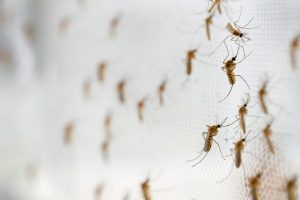Where Do Mosquitoes Breed in Georgia?
Where there is standing water, you’re sure to find mosquitoes in the spring and summertime. Standing water can be found in a variety of places in or around your property. The most common mosquito breeding grounds in our region can be:
- Ponds or marshes
- Puddles
- Birdbaths or fountains
- Pools or spas
- Garden planters
- Children’s playsets
- Stacks of tires
- Buckets
- Clogged gutters/drains

Where to Find Mosquito Eggs
To hatch, mosquito eggs need to be touching or nearby a source of standing water. Therefore, female mosquitoes always look for a source of still, stagnant water to lay their eggs in. While they prefer shallow bodies of water, they can easily make use of deeper bodies of water when necessary. Mosquito eggs can be in groups of 100–300 eggs and are submerged into the standing water. A group of eggs, called a “raft”, is tiny—they can look like just a speck floating in the water. Unless you know precisely what you’re looking for, it can be difficult to spot mosquito eggs.
Say Goodbye to Pest Problems for Good!
Do Mosquitoes Require Water to Breed?
All types of mosquitoes use water to lay their eggs, as water is needed for the eggs to hatch. Some species will lay their eggs directly on the water, while others will lay their eggs nearby the source of standing water. While rare, eggs that are laid too far away from the water are able to survive for years before hatching. However, in general, mosquitoes need water to reproduce.
Mosquito Breeding Grounds in Georgia
Even a bottle cap filled with water can be utilized by mosquitoes. This shows that there are many things in your yard that could be used as a breeding ground. A small bucket, a stack of tires, or a garden plater can all house mosquitoes. This makes it important to know how to prevent mosquitoes from using your yard as their breeding grounds each and every year. The professional mosquito exterminators at Active Pest Control can help locate potential breeding grounds near your home and eliminate them before mosquito season begins.
Where Do Mosquitoes Breed in Georgia? in Georgia
Serving Your Pest Needs for Over 35 Years Across Georgia

